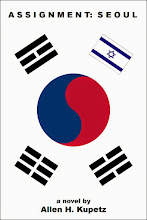
http://www.economist.com/node/21547255
IT IS sometimes asserted that low South Korean equity valuations stem from the threat of instability in North Korea. That explanation looked a lot less convincing after the death of Kim Jong Il in December, when the KOSPI 200 index of leading shares and the won, the South Korean currency, both quickly shrugged off the news.
So what is the source of the “Korea discount”, which means that the KOSPI has a forward price-to-earnings ratio of under ten, below most other Asian stockmarkets (see chart)? There are a few possibilities. The national economic model is still built on exports, often in highly cyclical industries such as shipbuilding. The capital structure of South Korean firms has historically been debt-heavy.
But the prime cause of the discount is more likely to be poor corporate governance at the family-run chaebol conglomerates that dominate the economy. Nefarious schemes to pass on control to sons, avoid taxes and exploit company assets for the benefit of family members are widely discussed in private. They are also lambasted abroad: a 2010 survey by CLSA, a broker, placed the country third-from-bottom in Asia on governance, ahead of only Indonesia and the Philippines.
The issue is now also getting more of an airing at home. A recent report by Tongyang Securities, a broker, drew an explicit link between Korea’s low equity valuations and the practices of “tunnelling” and “propping”, which benefit insiders at the expense of smaller investors.
Tunnelling is the awarding of contracts to firms owned by family members. Chaebol heads typically own only a small portion of their firms, but are able to maintain control through complex cross-holdings; tunnelling offers a means of exploiting that control to get richer, quicker. In 2007, for instance, the Fair Trade Commission, an official watchdog, fined Hyundai Motor for, among other things, giving 1.3 trillion won ($1.4 billion) of business to Glovis, a firm owned by the son of Hyundai’s chairman—without any tendering.
Propping is similar to tunnelling, and means that unviable units get financial support from sister companies. But it is no less damaging to small investors. If company insiders are able to misuse shareholders’ funds at will, would-be investors will reduce their expectations of future cash flows and thus attach lower valuations to stocks.
Other allegations are even more serious. On February 3rd Hanwha Group announced in a regulatory filing that its chairman, Kim Seung-yeon, was among several officials being investigated for alleged embezzlement. Chey Tae-won, the chairman of SK Group, was indicted in January over the disappearance of 99 billion won from company coffers, as part of a scheme allegedly planned by his brother to cover futures-trading losses. Mr Chey denies the charges. The Federation of Korean Industries, a chaebol pressure group, has urged prosecutors to go easy on Mr Chey. They say that punishing him would harm “entrepreneurial spirit”.
Mr Chey has had previous scrapes, having been convicted of a billion-dollar accounting fraud in 2003. He eventually received a full pardon from the president and was also chosen to represent the nation during the 2010 G20 summit, leading a meeting of international chief executives. Lee Kun-hee, the chairman of Samsung, received a similar pardon in 2009, having been found guilty of tax evasion, and was picked to front South Korea’s bid for the 2018 Winter Olympics. Yujeon mujwai, mujeon yujwai—an old expression meaning “money = innocence, no money = guilt”—is enjoying a resurgence in popularity.
The irony is that the largest chaebol are models of efficient production and are enjoying a golden period. Their success, say proponents, vindicates the family-run approach to business. Their ownership structure means they have no need to appease short-termist investors or to meet quarterly earnings targets; instead, they can invest for the long run. Smaller shareholders have reason to feel less thrilled. ◦


